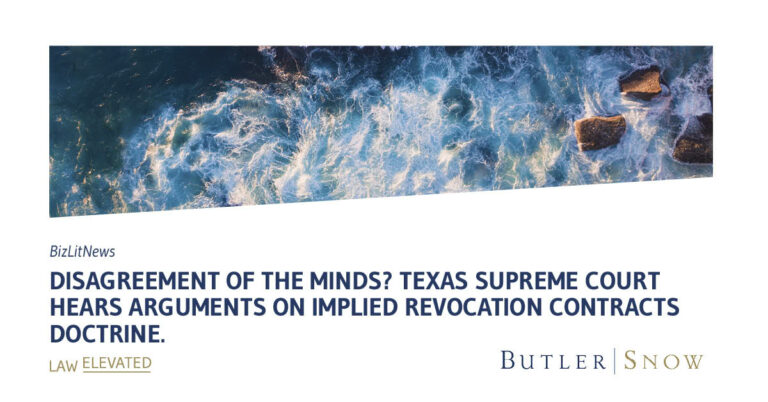“Meeting of the minds” is a phrase that every lawyer remembers spoken in the voice of their 1L contracts professor. Amid the explanation of offer, acceptance, and the ever-perplexing concept of consideration, the objective “meeting of the minds” principle clarified the basic requirements of an enforceable contract: both parties need to be on the same page regarding formation and terms.
However, the simple phrase is not as clear in practice as it seemed in the classroom. This past September, the Texas Supreme Court heard oral argument in Tauch v. Angel, 580 S.W.3d 808 (Tex. App.—Houston [14th District] 2019, pet. granted) (oral argument before the Texas Supreme Court in Cause No. 19-0793 occurred on Sept. 15, 2021), which addresses critical issues for Texas contract law. The case began when First Federal Bank won a $4.6 million judgment against Tauch in a South Carolina district court. South State Bank, First Federal Bank’s successor in interest, domesticated the judgment in Texas and began negotiations with Tauch in late 2015 about settling and releasing the judgment. Unknown to Tauch, South State Bank was simultaneously negotiating with a third party, Virginia Angel, to assign the $4.6 million judgment to Angel.
On April 11, 2016, South State Bank e-mailed Tauch with an offer to release the judgment for $2 million. James Holden, the bank’s senior vice president, informed Tauch that “the bank will likely be look[ing] at other collection alternatives,” so Tauch needed to let Holden know if he was accepting the $2 million offer “as quickly as possible.”
Two days later, Angel e-mailed Tauch’s attorney and informed him that the bank assigned its interest in the judgment to Angel and demanded immediate payment for the full amount of the $4.6 million judgment. At Tauch’s request, Angel’s attorney sent a copy of the assignment agreement to Tauch’s attorney at 5:23 p.m. on April 13, the terms of which stated that the bank would receive $3 million upon collection of the judgment and Angel would receive the remainder.
Noticing that the assignment agreement’s effective date was the next day, April 14, Tauch e-mailed Holden at 6:12 p.m. on April 13 and accepted the bank’s $2 million offer to release the judgment. The bank responded by informing Tauch that his judgment was assigned to Angel before Tauch’s acceptance and that Tauch should make all payments directly to the assignee, Angel. Angel filed suit seeking a declaration that, among other things, Tauch could not have accepted the bank’s settlement offer on April 13 because Tauch’s receipt of the assignment agreement terminated his power of acceptance.
The crux of Angel’s argument is the doctrine of implied revocation. Ordinarily, an offeror may revoke an offer at any time before it is accepted, but the parties in Angel dispute how to properly communicate revocation. Under the Restatement (Second) of Contracts, an offeree’s power of acceptance is terminated “when the offeror takes definite action inconsistent with an intention to enter into the proposed contract and the offeree acquires reliable information to that effect.” Restatement (Second) of Contracts, § 43 (Am. Law Inst. 1981). This is known as “implied revocation” because there is no direct communication from the offeror—the offeree’s power to accept is terminated by learning of the offeror’s inconsistent action. Accordingly, Angel argues that Tauch’s receipt of the assignment agreement constituted reliable information, and thus Tauch had knowledge that the bank’s settlement offer was no longer on the table.
Tauch argues, on the other hand, that the communication was not reliable because it came from a third party, Angel, rather than the offeror, the bank. Therefore, according to Tauch, the communication did not terminate Tauch’s ability to accept the $2 million settlement. Tauch further argues that a reasonable person acting in good faith in Tauch’s position would believe that the assignment agreement’s April 14 effective date meant that Tauch still had one day to accept the $2 million offer.
The Restatement contemplates this objective test when determining if an offer has been impliedly revoked, questioning whether a reasonable person would believe that the offeror’s action was definite and inconsistent with the offer. Angel asserts that the bank’s agreement to assign the judgment to Angel for $3 million signaled to any reasonable person that the bank was no longer willing to release it to Tauch for $1 million less. Tauch counters that a reasonable person acting in good faith could have concluded that the two agreements are not mutually exclusive; the bank still intended to enter into its proposed settlement with Tauch based on the April 14 effective date.
The trial court granted Angel’s motion for summary judgment. The 14th Court of Appeals court reversed and remanded, holding that the assignment did not impliedly revoke Tauch’s power of acceptance. Tauch v. Angel, Trustee for Gobsmack Gift Trust, 580 S.W. 3d, 808 (Tex. App.—Houston [14th] 2019, pet. granted). Citing Restatement (Second) of Contracts § 43, the court of appeals explained that the assignment was not an action inconsistent with entering into the settlement agreement, because Tauch accepted the settlement offer before the assignment’s effective date. Justice Frost dissented, finding that Tauch’s knowledge of the assignment before accepting made the assignment an inconsistent act under § 43 and revoked the offer.
In deciding this case, the Texas Supreme Court tackles two critical issues: (1) does a revocation have to be clear and unequivocal? And (2) should revocation have to be communicated by the offeror, or may information from a third party terminate the offeree’s ability to accept? The Angel decision will have a significant impact on contract formation in Texas. Namely, will the “meeting of the minds” requirement last? If an offeree purports to accept an offer with knowledge that the offeror may have changed her mind, will there be a binding contract?
The case number is 19-0793. The Court will hand down its opinion sometime between now and the beginning of June 2022.
